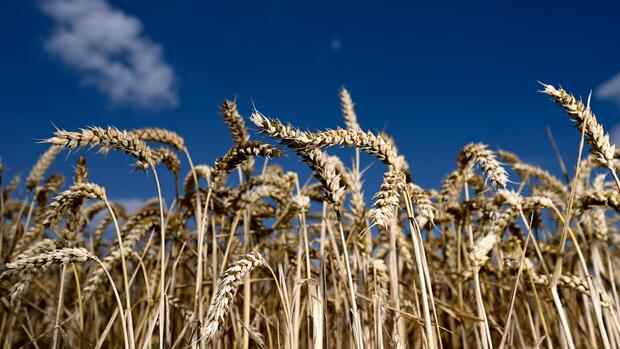The federal government wants to transport up to 52 containers or several thousand tons of grain out of the Ukraine with each train.
(Photo: dpa)
Berlin, Frankfort Railway transports by the freight transport subsidiary DB Cargo are intended to ensure this year’s agricultural production in Ukraine despite the war and to replace the sea transports that are currently missing. The Handelsblatt learned about this plan from the federal government together with DB Cargo from government circles. A spokesman for Deutsche Bahn confirmed on request that “there are plans on this subject.”
“As the rail transport officer, I am committed to ensuring that the 20 million tons of grain can be shipped in order to avert a world hunger catastrophe,” said the parliamentary state secretary in the Federal Ministry of Transport, Michael Theurer, to the Handelsblatt.
Theurer confirmed that talks were being held with the Ukrainian railways and other European railways, such as the neighboring railways in Poland, the Czech Republic, Slovakia and Romania. “We are currently examining how the grain bridge can be implemented in concrete terms,” said the FDP politician. In the industry there is talk of a total of up to 20,000 trains that the state railways could run. It is about the financing of the measures via the federal budget as well as questions of competitive neutrality.
Transports by train are more expensive than by ship, he explained. According to Theurer, departmental coordination is already underway within the federal government. The Federal Ministry of Finance, the agricultural and economic departments and the Ministry for Economic Cooperation and Development are involved.
Top jobs of the day
Find the best jobs now and
be notified by email.
The plan is also part of talks with the European Commission and the United Nations, whose Secretary-General António Guterres warned of a “hurricane of hunger” at the start of the war. In the EU, the plan could become part of Europe’s reconstruction aid for Ukraine.
Up to 52 containers can be transported per train
The so-called “grain bridge” involves two aspects. On the one hand, the interrupted supply chains should be secured via the seaports. Ukraine mainly delivers its grain to the world by ship. Since shipping traffic worldwide has gotten mixed up in view of the war sanctions against Russia, but also due to the corona measures in Shanghai, China, the railways should therefore handle the transports overland accordingly.
>> Also read here: 24,000 Ukrainian railway wagons with wheat, vegetable oil and chemicals are stuck
On the other hand, it is also important to bring agricultural equipment to Ukraine, from spare parts to new tractors, combine harvesters and other vehicles. Ukrainian farmers are sowing seeds in the west of the country these days. Agricultural machinery manufacturers like Claas are trying to deliver these days, but are suffering from delivery bottlenecks themselves.
The railway subsidiary DB Cargo in particular will play a central role in the planned grain bridge for several reasons. In the past few weeks, the state-owned company has shown that the rail route to Ukraine is largely intact. At the beginning of March, the company launched the so-called “rail bridge for aid supplies”. The company collects donations for the people of Ukraine by truck, packs them in containers and then takes them to Ukraine by freight train.
Up to 52 containers or several thousand tons can be transported with each train. “What works in the Ukraine, of course, also goes out of the Ukraine,” said Deutsche Bahn. According to expert circles, the freight problems could be solved by rail with a suitable circulation system.
DB Cargo also offers a train network that also connects important ports, for example on the Adriatic or on the North Sea coast. There, the grain could be transhipped and transported by ship to the regions that need it most. Above all, countries like Ethiopia, Lebanon or Indonesia are dependent on grain from the Ukraine.
So far, the federal government has approved 430 million euros for measures to respond to the looming global hunger crisis. How the money will be distributed is to be determined in the supplementary budget that the Federal Cabinet will decide on this Wednesday. Then it should also be clear how much money should be available for the renewed transport of grain from the Ukraine.
More: Chaos in the rail network: why the German chemical triangle has been left behind by the railways
